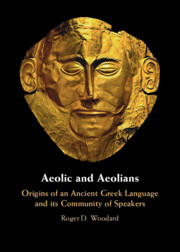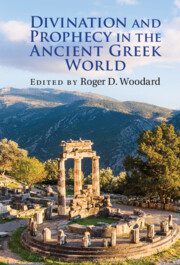135 results

Aeolic and Aeolians
- Origins of an Ancient Greek Language and its Community of Speakers
- Coming soon
-
- Expected online publication date:
- August 2024
- Print publication:
- 31 August 2024
-
- Book
- Export citation
4 - Greek Linguistic Thought and its Roman Reception
- from Part I - Ancient, Classical, and Medieval Periods
-
-
- Book:
- The Cambridge History of Linguistics
- Published online:
- 20 July 2023
- Print publication:
- 10 August 2023, pp 102-143
-
- Chapter
- Export citation
1 - Greek Divination as the Transformation of an Indo-European Process
-
-
- Book:
- Divination and Prophecy in the Ancient Greek World
- Published online:
- 22 December 2022
- Print publication:
- 05 January 2023, pp 13-49
-
- Chapter
- Export citation
Contents
-
- Book:
- Divination and Prophecy in the Ancient Greek World
- Published online:
- 22 December 2022
- Print publication:
- 05 January 2023, pp v-vi
-
- Chapter
- Export citation
Acknowledgments
-
- Book:
- Divination and Prophecy in the Ancient Greek World
- Published online:
- 22 December 2022
- Print publication:
- 05 January 2023, pp viii-viii
-
- Chapter
- Export citation
Abbreviations
-
- Book:
- Divination and Prophecy in the Ancient Greek World
- Published online:
- 22 December 2022
- Print publication:
- 05 January 2023, pp ix-x
-
- Chapter
- Export citation
Bibliography
-
- Book:
- Divination and Prophecy in the Ancient Greek World
- Published online:
- 22 December 2022
- Print publication:
- 05 January 2023, pp 282-312
-
- Chapter
- Export citation
11 - Afterword
-
-
- Book:
- Divination and Prophecy in the Ancient Greek World
- Published online:
- 22 December 2022
- Print publication:
- 05 January 2023, pp 261-281
-
- Chapter
- Export citation
Index
-
- Book:
- Divination and Prophecy in the Ancient Greek World
- Published online:
- 22 December 2022
- Print publication:
- 05 January 2023, pp 313-320
-
- Chapter
- Export citation
Copyright page
-
- Book:
- Divination and Prophecy in the Ancient Greek World
- Published online:
- 22 December 2022
- Print publication:
- 05 January 2023, pp iv-iv
-
- Chapter
- Export citation
Contributors
-
- Book:
- Divination and Prophecy in the Ancient Greek World
- Published online:
- 22 December 2022
- Print publication:
- 05 January 2023, pp vii-vii
-
- Chapter
- Export citation

Divination and Prophecy in the Ancient Greek World
-
- Published online:
- 22 December 2022
- Print publication:
- 05 January 2023
Index
-
- Book:
- The Textualization of the Greek Alphabet
- Published online:
- 05 April 2014
- Print publication:
- 24 March 2014, pp 357-367
-
- Chapter
- Export citation
Bibliography
-
- Book:
- The Textualization of the Greek Alphabet
- Published online:
- 05 April 2014
- Print publication:
- 24 March 2014, pp 343-356
-
- Chapter
- Export citation
4 - The Syntagmatic Structure of the Copper Plaques
-
- Book:
- The Textualization of the Greek Alphabet
- Published online:
- 05 April 2014
- Print publication:
- 24 March 2014, pp 119-139
-
- Chapter
- Export citation
7 - The Warp and Weft of Writing
-
- Book:
- The Textualization of the Greek Alphabet
- Published online:
- 05 April 2014
- Print publication:
- 24 March 2014, pp 227-290
-
- Chapter
- Export citation
Notes
-
- Book:
- The Textualization of the Greek Alphabet
- Published online:
- 05 April 2014
- Print publication:
- 24 March 2014, pp 291-342
-
- Chapter
- Export citation
6 - Of Styluses and Withes
-
- Book:
- The Textualization of the Greek Alphabet
- Published online:
- 05 April 2014
- Print publication:
- 24 March 2014, pp 177-226
-
- Chapter
- Export citation
Preface
-
- Book:
- The Textualization of the Greek Alphabet
- Published online:
- 05 April 2014
- Print publication:
- 24 March 2014, pp xi-xii
-
- Chapter
- Export citation
5 - Langue et Écriture
-
- Book:
- The Textualization of the Greek Alphabet
- Published online:
- 05 April 2014
- Print publication:
- 24 March 2014, pp 140-176
-
- Chapter
- Export citation



